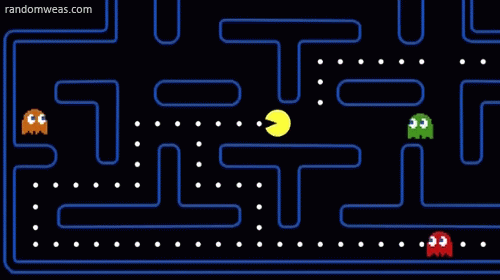Will machines eventually grow intelligent enough to eliminate humans? One can only hope so. I mean, have you watched the orange-headed man discuss the length of his ding-dong at the GOP debates?
In all seriousness, I think the discussion about humans vs. machines is inherently flawed. It supposes that Homo sapiens as we know them will endlessly be the standard. Really unlikely. If our Anthropocene sins don’t doom us, we’ll likely have the opportunity to engineer a good part of our evolution, whether it’s here on Earth or in space. (Alien environments we try to inhabit will also change the nature of what we are.) Ultimately, it will be a contest between Humans 2.0 and Strong AI, though the two factions may reach detente and merge.
For the time being, really smart researchers teach computers to teach themselves, having them use Deep Learning to master Pac-Man and such, speeding the future here a “quarter” at a time. From an article about the contemporary London AI scene by Rob Davies in the Guardian:
Murray Shanahan, professor of cognitive robotics at Imperial, believes that while we should be thinking hard about the moral and ethical ramifications of AI, computers are still decades away from developing the sort of abilities they’d need to enslave or eliminate humankind and bringing Hawking’s worst fears to reality. One reason for this is that while early artificial intelligence systems can learn, they do so only falteringly.
For instance, a human who picks up one bottle of water will have a good idea of how to pick up others of different shapes and sizes. But a humanoid robot using an AI system would need a huge amount of data about every bottle on the market. Without that, it would achieve little more than getting the floor wet.
Using video games as their testing ground, Shanahan and his students want to develop systems that don’t rely on the exhaustive and time-consuming process of elimination – for instance, going through every iteration of lifting a water bottle in order to perfect the action – to improve their understanding.
They are building on techniques used in the development of DeepMind, the British AI startup sold to Google in 2014 for a reported £400m. DeepMind was also developed using computer games, which it eventually learned to play to a “superhuman” level, and DeepMind programs are now able to play – and defeat – professional players of the Chinese board game Go.
Shanahan believes the research of his students will help create systems that are even smarter than DeepMind.•
Tags: Murray Shanahan, Rob Davies

